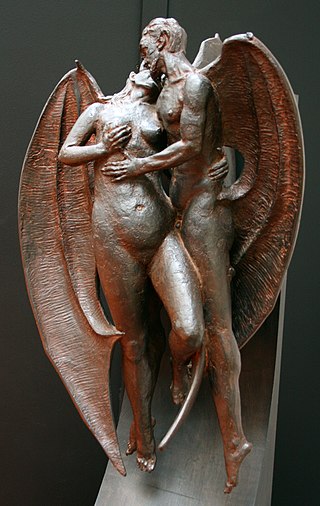Related Research Articles

A devil is the personification of evil as it is conceived in various cultures and religious traditions. It is seen as the objectification of a hostile and destructive force. Jeffrey Burton Russell states that the different conceptions of the devil can be summed up as 1) a principle of evil independent from God, 2) an aspect of God, 3) a created being turning evil, and 4) a symbol of human evil.
In Judaism, the Holy Spirit is the divine force, quality, and influence of God over the Universe or over his creatures. In Nicene Christianity, the Holy Spirit or Holy Ghost is the third person of the Trinity. In Islam, the Holy Spirit acts as an agent of divine action or communication. In the Baha’i Faith, the Holy Spirit is seen as the intermediary between God and man and "the outpouring grace of God and the effulgent rays that emanate from His Manifestation".
In many religious and philosophical traditions, there is a belief that a soul is "the immaterial aspect or essence of a human being". In lay terms the soul is the spiritual essence of a person, which includes our identity, personality, and memories that is believed to be able to survive our physical death.
Salvation is the state of being saved or protected from harm or a dire situation. In religion and theology, salvation generally refers to the deliverance of the soul from sin and its consequences. The academic study of salvation is called soteriology.

William Olaf Stapledon – known as Olaf Stapledon – was a British philosopher and author of science fiction. In 2014, he was inducted into the Science Fiction and Fantasy Hall of Fame.
Impassibility describes the theological doctrine that God does not experience pain or pleasure from the actions of another being. It has often been seen as a consequence of divine aseity, the idea that God is absolutely independent of any other being, i.e., in no way causally dependent. Being affected by the state or actions of another would seem to imply causal dependence.
The concept of an immaterial and immortal soul – distinct from the body – did not appear in Judaism before the Babylonian exile, but developed as a result of interaction with Persian and Hellenistic philosophies. Accordingly, the Hebrew word נֶ֫פֶשׁ, nephesh, although translated as "soul" in some older English-language Bibles, actually has a meaning closer to "living being". Nephesh was translated into Greek in the Septuagint as ψυχή (psūchê), using the Greek word for "soul". The New Testament also uses the word ψυχή, but with the Hebrew meaning and not the Greek.
In folk belief, spirit is the vital principle or animating essence within all living things. As recently as 1628 and 1633 respectively, both William Harvey and René Descartes still speculated that somewhere within the body, in a special locality, there was a "vital spirit" or "vital force", which animated the whole bodily frame, just as the engine in a factory moves the machinery in it.
Daniel A. Helminiak is a Catholic priest, theologian and author in the United States. He is most widely known for his international best-seller What the Bible Really Says about Homosexuality.
A personal god, or personal goddess, is a deity who can be related to as a person, instead of as an impersonal force, such as the Absolute, "the All", or the "Ground of Being".

The General Church of the New Jerusalem is an international church based in Bryn Athyn, Pennsylvania, and based on the Old Testament, the New Testament, and the theological works of Emanuel Swedenborg. The General Church of the New Jerusalem distinguishes itself from other Swedenborgian churches by teaching that the Writings for the New Church are the Heavenly Doctrine revealed by the Lord in His Second Coming and have authority equal to the Old and New Testaments. It is larger, newer, and more conservative than the Swedenborgian Church of North America.

The Holy Spirit is mentioned four times in the Quran, where it acts as an agent of divine action or communication. The Muslim interpretation of the Holy Spirit is generally consistent with other interpretations based upon the Old and the New Testaments. Further, the Quran refers to rūḥ as Ruh al-qudus and ar-ruh al-amin. The holy spirit is more commonly known as archangel Gabriel, the messenger to all the prophets.
A spirit body is, according to the Church of Jesus Christ of Latter-day Saints, the organization of a spiritual element, made into the spiritual form of man, which was made in the same likeness of God the Father. This likeness apparently gave rise to the phrase and meaning of, "like father like son," which means the son is in the likeness of the father, which provides meaning to the claim that humanity was made in the likeness of God. Generally, people in the world have commonly used the word "soul" to denote this spirit body.
In Christian theology, the tripartite view (trichotomy) holds that humankind is a composite of three distinct components: body, spirit, and soul. It is in contrast to the bipartite view (dichotomy), where soul and spirit are taken as different terms for the same entity.
Robert Bunger Thieme, Jr. was pastor of Berachah Church, a nondenominational Christian church in Houston, Texas, from 1950 to 2003. Affectionately called "the Colonel" by his congregation, he was a dispensationalist theologian who wrote over a hundred books and conducted over 10,000 sermons on various theological topics during his 55 years as a pastor.

In the context of Christian theology, Christian anthropology is the study of the human (anthropos) as it relates to God. It differs from the social science of anthropology, which primarily deals with the comparative study of the physical and social characteristics of humanity across times and places.

There are three central ideas in Sufi Islamic psychology, which are the Nafs, the Qalb (heart) and the Ruh (spirit). The origin and basis of these terms is Qur'anic and they have been expounded upon by centuries of Sufic commentaries.
Nephesh is a Biblical Hebrew word which occurs in the Hebrew Bible. The word refers to the aspects of sentience, and human beings and other animals are both described as being nephesh. Plants, as an example of live organisms, are not referred in the Bible as being nephesh. The term נפש is literally "soul", although it is commonly rendered as "life", "living being" and "creature" in English translations. One view is that nephesh relates to sentient being without the idea of life and that, rather than having a nephesh, a sentient creation of God is a nephesh. In Genesis 2:7 the text is not that Adam was given a nephesh but that Adam "became a living nephesh." Nephesh when put with another word can detail aspects related to the concept of nephesh; with רוּחַ rûach ("spirit") it describes a part of mankind that is immaterial, like one's mind, emotions, will, intellect, personality, and conscience, as in Job 7:11.

Christian theology is the theology of Christian belief and practice. Such study concentrates primarily upon the texts of the Old Testament and of the New Testament, as well as on Christian tradition. Christian theologians use biblical exegesis, rational analysis and argument. Theologians may undertake the study of Christian theology for a variety of reasons, such as in order to:
This is a glossary of terms used in New Thought.
References
- ↑ Daniel A. Helminiak (1996), The human core of spirituality: mind as psyche and spirit, ISBN 978-0-7914-2950-1
- ↑ Olaf Stapledon (1944), What Are "Spiritual" Values?, archived from the original on 2013-04-22
- ↑ John Teske (2000), "The Social Construction of the Human Spirit", The human person in science and theology, ISBN 978-0-567-08692-1
- 1 2 3 Spengler, Oswald (1922). "vol2, chpt: 3 & 8". The Decline of the west (An abridged ed.). Vintage Books, 2006. ISBN 1-4000-9700-2.
- ↑ Wommack, Andrew. "Understanding Spirit, Soul, And Body". Andrew Wommack Ministires. Retrieved 2010-01-21.